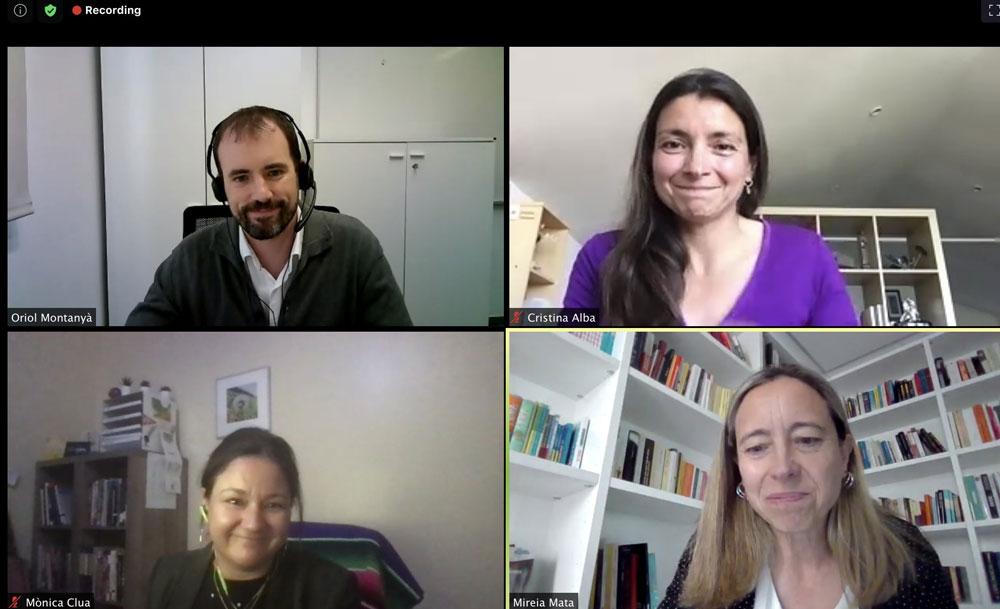
- About UPF-BSM
- Programs
- Faculty and research
- Companies and Organizations
- News & Events
"Globalization, like eyeglasses, needs to be properly graduated"
5 Mayo - 2021For decades, globalization has been the prevailing trend, generating great expectations and even increasing the world's GDP. Thanks to globalization, a large part of the population now has access to faster, cheaper and safer transportation methods and communication channels. This distribution is uneven and globalization has not yet benefited everyone. In fact, there are already several indicators showing that this trend needs to be reversed.
Based on this diagnosis, the webinar "Globalization vs. Deglobalization: impact on logistics, politics and the economy", provided the panelists a starting point to answer whether the world after COVID-19 will be less global. "Globalization, like eyeglasses, needs to be properly graduated", warned Cristina Alba, alumni of the Master in Finance and Banking and member of the UPF-BSM Alumni Advisory Council. "It is true that globalization has given us many benefits, but we also see many imbalances", she added.
Globalization has given us many benefits, but we also see many imbalances
In this regard, the director of the Master in Public and Social Policy at UPF-BSM and professor of Political Science at the University of Texas Rio Grande Valley, Monica Clua, pointed out that "globalization is currently being questioned". "Globalization was the hegemonic mindset and there was no alternative until the rise of Trump in 2016, with his radical anti-globalization turn and his commitment to free trade", said Clua. "We were already perceiving this evolution", she said, "but in the last 5 years it has taken an unpredictable route". Something that the pandemic has further boosted.

Sprinting towards a change of trend
"This discussion has been going on for many decades on a theoretical level, but the difference today is that now it has also reached companies", said Oriol Montanyà, director of the Operations, Technology and Science Area, the Postgraduate Course in Total Supply Chain Management and the Sustainability Observatory at UPF-BSM, who explained how in an environment with many factors that make supply chains difficult "resilience is a key factor".
"We have witnessed it with recent incidents such as the Suez Canal or the shortage of chips to build cars", he said, while pointing out some practices being implemented to avoid collapse. "The current logistic processes have been reinforced by creating contingency plans that did not exist until now and expanding the stock", he added, and gave as an example the resistance of the agri-food sector during the worst months of the pandemic.
Until recently, international transport was a bargain, but now this model is on check
But what about the economy? Although there have been signs of the beginning of a slowdown, Alba said that global data "are positive" and that all countries "are growing". At a time of change like the present, strategies are being rethought and relocation is being positively valued. "International transport was, until recently, a bargain, but now this model is on check", insisted Montanyà, who added another player to the table: sustainability.
Sustainability, a key actor
"Sustainability is call to play a fundamental role in the processes of globalization and de-globalization", said the director of the Sustainability Observatory, who recalled that the unit cost of the product is no longer enough, but that other aspects such as the carbon footprint are more important in the decision.
We are not immune epidemiologically, but neither we are immune socially. If the pandemic has taught us anything, it is that what happens anywhere in the world affect us
In her turn, Clua commented that there are various types of sustainability, emphasizing the concept of "sustainability of life". "We are not immune epidemiologically, but neither are we immune socially", she warned. "If the pandemic has taught us anything, it is that what happens anywhere in the world affects us", said Clua, who concluded: "as a developed North we have a vision that is too closed, and we must have a global vision".